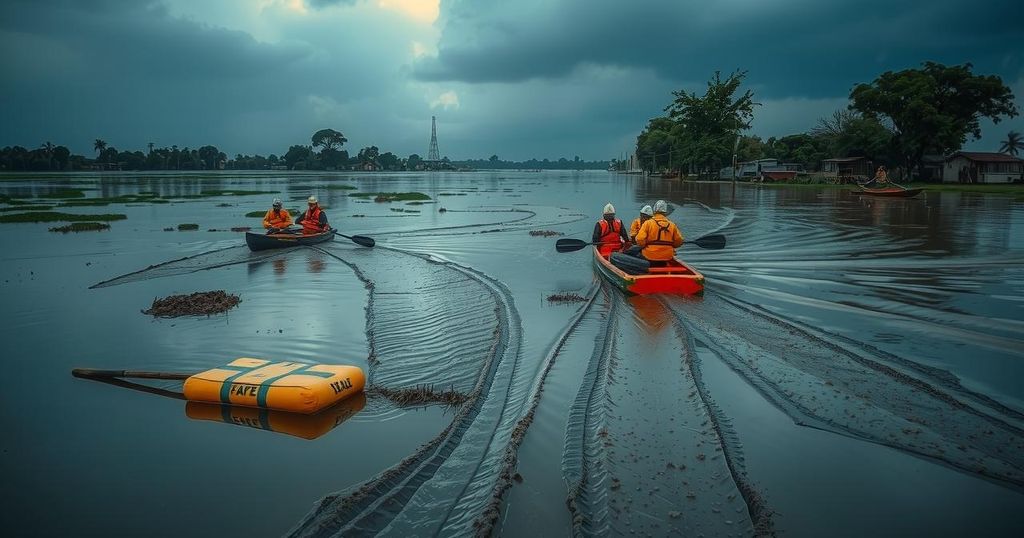WHO Responds to Severe Flooding and Health Crisis in South Sudan

South Sudan is experiencing unprecedented flooding that has displaced over 226,000 people, severely impacted health facilities, and exacerbated an existing humanitarian crisis. The WHO is mobilizing resources and coordinating health responses to address rising health concerns, including cholera and malaria. WHO’s efforts encompass distributing emergency medical supplies and training healthcare workers to strengthen health infrastructure in affected communities, while advocating for climate-resilient systems to mitigate future crises.
South Sudan is currently experiencing unprecedented flooding, impacting the lives and livelihoods of thousands. Over 226,000 individuals have been displaced as their homes are inundated, with roads and critical infrastructure submerged. The health infrastructure is severely compromised, with 58 health facilities submerged and nearly 90 others rendered inaccessible, disrupting essential health services across 42 of the 78 counties. Since early October 2024, it is reported that approximately 890,000 individuals are affected by the floods. This environmental disaster coincides with an existing humanitarian crisis, with South Sudan already sheltering around 800,000 refugees and returnees from neighboring Sudan. In Renk County, cholera cases have emerged, and malaria has escalated, with reported instances exceeding 120,000 and at least 31 suspected fatalities due to the disease. Additionally, the region has seen 55 snakebite incidents over five weeks, further complicating the public health situation. In response, the World Health Organization (WHO) is mobilizing efforts to address the impending health crisis alongside the Ministry of Health and various partners. Dr. Humphrey Karamagi, WHO’s representative in South Sudan, highlighted the heightened vulnerability of the population due to these cumulative emergencies, indicating WHO’s commitment to ensuring access to essential health services while addressing the rising humanitarian and health needs. WHO has deployed approximately 88 metric tonnes of emergency health kits to vital areas such as Renk, Bentiu, Malakal, and Bor, aimed at treating over 870,000 people. The supplied kits encompass critical medical supplies, including cholera treatment kits and antimalarial medications. Efforts also include the distribution of nearly 1,300 malaria kits throughout the nation and the prepositioning of cholera diagnostic tests. The organization is coordinating with local authorities to assess urgent needs within affected areas, particularly in Cueibet County. This includes training health workers and safeguarding health facilities against potential damage. WHO continues to monitor the situation, focusing on vector-borne and waterborne disease risks while striving to ensure prompt health assistance reaches those in need. In alignment with broader initiatives across the African region, WHO is advocating for climate-resilient health systems that can withstand the ongoing and emerging environmental threats due to climate change. Effective action requires strong legal and operational frameworks, scientific evidence to assess health vulnerabilities, and sustainable investments to enhance the resilience of health structures and infrastructure.
The severe flooding in South Sudan is primarily driven by climate change and the country’s rainy season, which usually lasts from April to November. Traditionally, this period sees heavy rains leading to flooding; however, the intensity and frequency of these floods have amplified significantly in recent years, leading to devastating humanitarian consequences. An already fragile health system faces additional strain due to the influx of refugees from Sudan, worsening public health concerns, and the risks of outbreaks of diseases such as cholera and malaria. The WHO’s involvement underscores the organization’s commitment to alleviating health crises in the region, reinforcing health infrastructure, and addressing the challenges posed by climate change.
In conclusion, the flooding in South Sudan has exacerbated an existing humanitarian crisis, displacing thousands and overwhelming health services in the region. The WHO’s proactive response, involving the distribution of emergency medical supplies and the collaboration with local health authorities, demonstrates an essential effort to mitigate the public health impacts of this disaster. It is imperative that future strategies integrate climate resilience into health systems to safeguard vulnerable populations against similar crises in the future.
Original Source: www.afro.who.int






